SEO and content marketing attract new clients to your site, but these tactics take months to start gaining traction. It can even take years before they drive impressive amounts of traffic.
Fortunately, there’s another way to get started faster. Of course, there’s a little risk involved.
With pay-per-click (PPC) advertising, you put out an ad and pay the network host whenever someone clicks the ad.
What is the relationship between SEO and PPC? Our guide will teach you this and more.
What is PPC in Digital Marketing?
Pay-per-click advertising is a marketing model where advertisers pay a fee whenever someone clicks their ad. It’s technically a way to buy visits to your business’ site, as opposed to organically “earning” them.
How does it work, exactly?
Search engine advertising allows businesses to bid for ad placement in the sponsored links section of a search engine results page.
These links appear whenever someone searches a keyword relevant to the business. Considering sites like Google get 3.5 billion daily queries, it shouldn’t surprise you that these ads can get considerable exposure. This is what a PPC ad would look like.
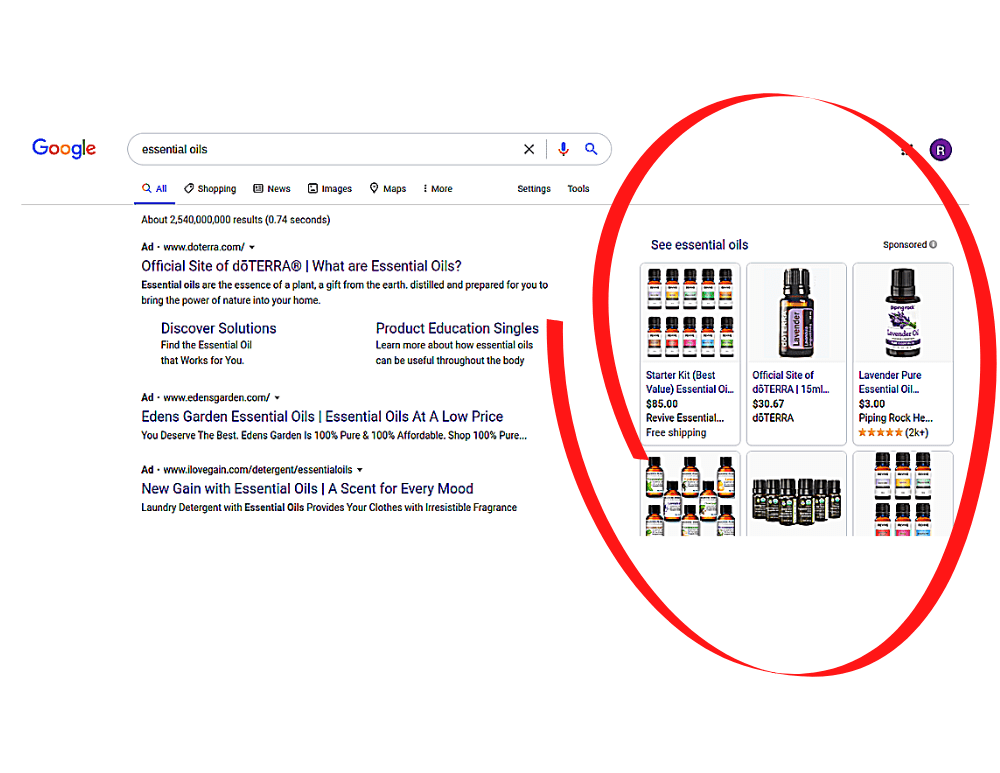
No wonder businesses love to make money with pay per click.
While you do pay a small fee every time someone clicks your ad, the action does send an interested visitor to your website.
With the correct strategy, those visits are worth more than the fee, making it a small cost. If you paid Google $4 for a click to your store, but the visitor bought something for $500, that’s quite profitable!
PPC vs CPC
Once you have a campaign running, you need to measure how efficient your keywords are.
That’s where CPC, or cost per click, comes in.
If you paid $100 for an ad that 100 users clicked, your cost per click was $1. The more clicks you get, the lower your CPC will be. That’s the metric of a successful campaign.
“Key Takeaway: PPC is your approach, and CPC is the performance of your approach.”
Anatomy of a winning campaign
Long gone are the days when you could broadly pour money into ads and expect it to pay off with little work. These days, it’s essential to do your research and:
You Might Also Like
- Pick the right set of keywords.
- Organize them into ad groups and campaigns.
- Set up landing pages for these advertisements.
- Organize them up in a way that encourages conversions.
So what’s the relationship between SEO and PPC? Search engines reward advertisers who can create relevant and intelligent campaigns by reducing the cost per ad click.
That’s right: If your landing pages satisfy and help users, Google won’t charge you as much. Basic math tells us that’s translates into a more significant profit margin. Not rocket science.
How Does Pay-Per-Click Work?: The Basics
Beginning a campaign can seem overwhelming, however, it doesn’t need to be. Let’s get started. You can use PPC marketing with all kinds of campaign goals in mind, such as:
- Generating leads
- Increasing sales
- Spreading brand awareness
At the end of the day, a PPC campaign should be about relevance.
Users search for specific information, products, and services. Advertisers can show a targeted ad in direct response to these search queries.
Let’s say you want to sell someone yellow running shoes. You can create an ad that appears whenever someone explicitly enters “yellow running shoes” into the search bar. For example:
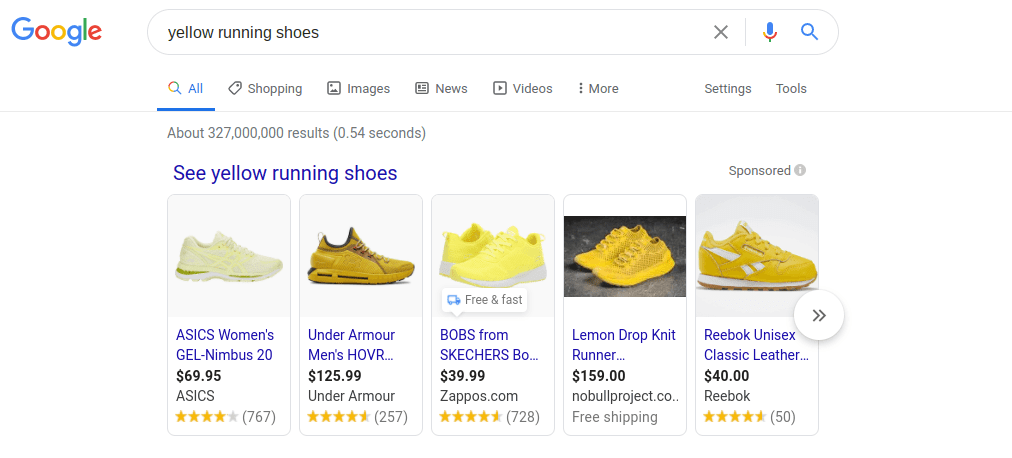
You can easily see, your ad will be placed directly in front of those searching for your exact product, if you target it correctly.
We can set-up and optimize your Google Ads for you but let’s also test your website’s SEO potential. Takes 60 seconds!
Paying for traffic is an important way for many businesses to grow but ranking naturally in Google for your important keywords is free. While Diib helps 1000s of businesses grow with Google Ads management, Diib is also one of the best SEO tools in the world and uses the power of big data to help you quickly and easily increase your traffic and rankings. Diib will even let you know if you already deserve to rank higher for certain keywords. As seen in Entrepreneur!
- Over 500,000 global members
- Keyword and backlink monitoring + ideas
- Built-in benchmarking and competitor analysis
- Easy-to-use automated SEO tool
- Speed, security, + Core Vitals tracking
- Too busy for SEO? Diib’s Growth Experts can set-up and optimize your ads!
Used by over 500k companies and organizations:
Syncs with 
Getting the advantages of PPC advertising
Through proper account structure and targeting, you can run a successful pay-per-click campaign as long as you focus on relevancy above all.
Using Google Ads can help you access its massive amounts of traffic at any given moment. By dipping your toes in a pool of billions, you stand the highest chance of gaining impressions, clicks, and conversions.
How often your ads appear to users depends on your keywords and match types. Though there are several factors involved in a successful PPC campaign, you can make big strides by prioritizing:
- Keyword relevancy: Coming up with relevant keyword lists, categorizing them into tight groups, and weaving them into ad text.
- Quality score: This is how Google rates whether your keywords, landing pages, and campaigns are relevant and intelligent. The higher quality your PPC ads, the less you’ll pay per click.
- Landing page quality: Make sure your landing pages have relevant content that can persuade readers to follow through on a call-to-action.
- Creativity: It’s one thing to have relevant words, but if they’re boring, nobody will read them. Wordstream offers a free Smart Ads Creator tool to assist with this process if you’re struggling to figure out how to use pay per click advertising effectively.
FACT: Roughly 52% of people shopping online prefer to click on paid advertisements atop Google’s search engine results pages. (PPC Resellers)
Google Ads
Think of Google AdWords similar to an auction house where you bid on items you want. You always have to keep a budget in mind as well as a bid.
The bid sets the amount you’re willing to pay for users to click. If yours is set to two dollars, Google only shows your ad if there aren’t others bidding more for the same placement.
Reducing cost per click
If people don’t bid as much for the keyword you’re targeting, then Google doesn’t spend the entire maximum bid. It optimizes impressions, so you might find that keyword costs less than $2 per click in the end.
Therefore, your cost per click can be lower than your highest bid, especially if your business has a good quality score. This is a metric we’ll discuss shortly. It measures your landing page’s user experience and the relevance of your site and the ad itself.
Naturally, Google wants to maximize its revenue. All things considered equal, it will show the ad created by the highest bidder.
But all things aren’t equal, so Google doesn’t focus on that alone — those ads would be horrible. They want their users to come back again, so they’ll only show them relevant, high-quality ads, even if that company pays less.
In the end, it pays to be relevant.
How does Google AdWords work?
Once upon a time, you could throw all the money you had at any keyword you wanted. It was just a straight auction that didn’t mean anything for users looking for specific products and services.
Fortunately, the Quality Score changed all that.
This metric considers many factors to evaluate the offer you’re making and decide whether it’s “good enough” to show a user. Here is a breakdown of the Quality Score by WordStream:
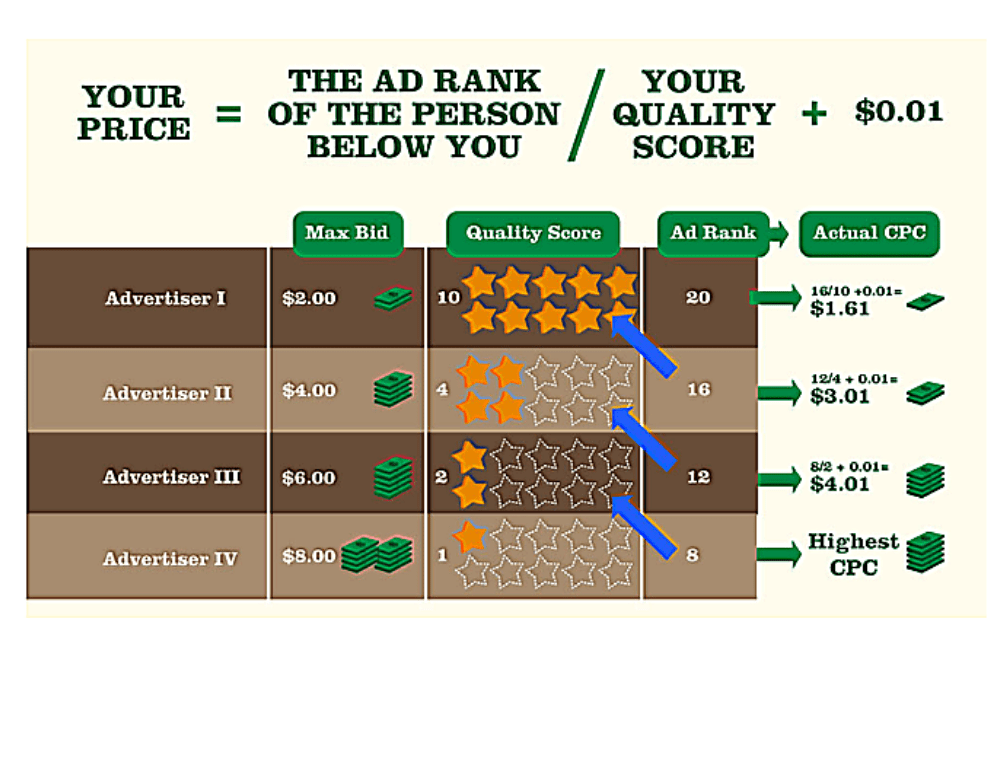
Relevancy
The most important factor is, as always, relevancy.
Let’s check out those running shoes again. Which keyphrase sounds the most relevant?
- “yellow running shoes Austin”
- “running shoe rentals”
This one’s obvious. Even though they’re not exactly apples and oranges, there’s only one that better describes what you’re offering.
But now consider a campaign when you’re using similar phrases, such as:
- “running shoe rentals”
- “running shoe rental cost”
- “running shoe rentals in Austin”
Now they’re all describing the same thing. This time, you have to figure out which key phrase is most popular. If you haven’t already put work into measuring this metric, you might consider creating individual ads for each keyword. These metrics will quickly teach you what is the relationship between SEO and PPC.
Other factors
Next, Google considers the historical and expected click-through rate for those keyphrases. It also takes your account history into consideration. Simply put, the older your account, the more likely your business is a brand with roots.
All these factors add up to your Quality Score. Multiply this score by your maximum bid, and you have your Ad Rank (see the above chart).
FACT: 58% of millennials purchased something due to an online or social media ad. (Clutch, 2017)
How to Use Pay Per Click Advertising on Other Platforms
If you haven’t spent much time learning about PPC, then Google Ads is probably the only platform you can think of.
It’s not the only one, but it’s definitely the biggest one by far. Every day, Google makes hundreds of millions with Ads alone.
Just about any niche can work Ads because of the sheer amount of traffic Google offers advertisers. It’s also a fantastic tool for conversions.
But again, it’s not your only option.
Bing
Bing isn’t nearly as big as Google, but it’s still a massive tool for advertisers.
It’s a well-developed tool that usually converts just as well, and at a lower cost per click. This makes it beneficial for smaller businesses with smaller budgets trying to run a profitable campaign.
For example, Wordstream notes that cost-per-click rates are about 33 percent cheaper. Additionally, one third of Bing users make $100,000 or more.
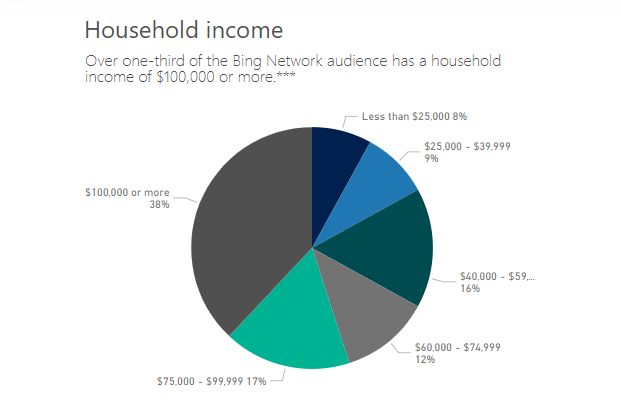
(Image Credit: Neil Patel)
If your keywords cost too much for Google Ads, you might find fewer competitors on Bing without losing too many conversions.
Facebook Ads
When it comes to social networks, Facebook has the most extensive user base in the world. The company is now a highly competitive element in many digital marketing strategies.
Though we could compare Facebook Ads to Google AdWords somewhat evenly, there’s a lot more nuance to it.
Unlike paid search, like AdWords, which helps you employ keywords to find new customers, paid social, like Facebook, helps users find you based on their behavioral profile. The Facebook Ad set up page looks like this:
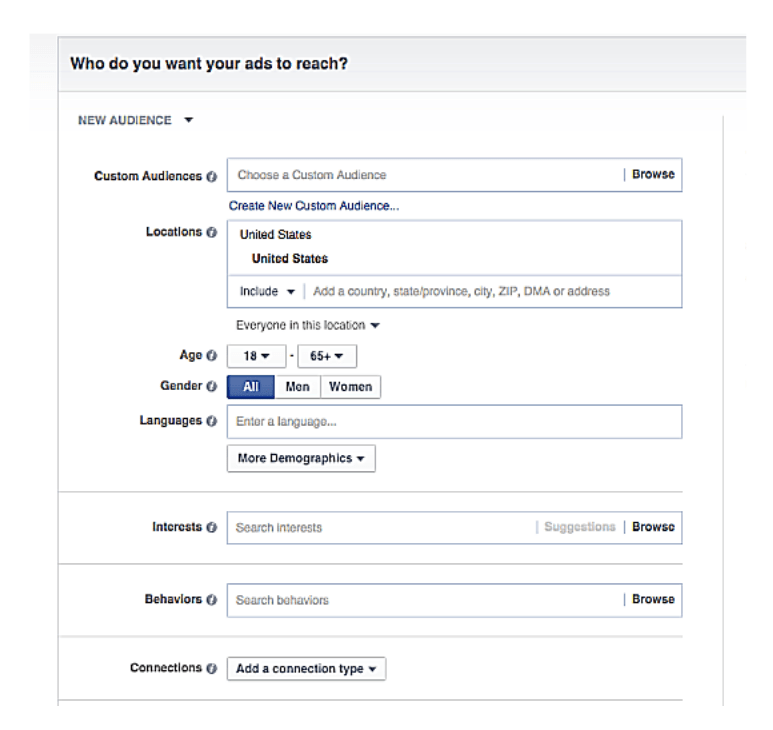
As you can see, you can target specific interests, behaviors, age groups and geographic groups. This can get highly specific and target exactly the group you seek.
The primary difference between the two platforms is simple: AdWords helps you find them, and Facebook helps them find you.
Let’s take a moment to examine the pros and cons of PPC advertising.
We hope that you found this article useful.
If you want to know more interesting about your site health, get personal recommendations and alerts, scan your website by Diib. It only takes 60 seconds.
Advantages of PPC advertising
Big data is bigger than ever
Entire tech companies dedicate themselves to gathering user data, and they have so much of it. With a good PPC campaign, you can access this data and fine-tune future campaigns for greater success.
For example, Facebook lets you get very specific with your target audience. You can target distinct genders, ages, and known interests with your ads. Google gives you detailed information about user behavior and historical search trends.
You have full control over PPC budget
As long as you set your limitations correctly, you’ll never go over budget. This is a feature available with Google, Bing, Facebook, and most well-organized platforms.
Once you reach your budget limit, your ad disappears. Nobody clicks on it anymore, and you don’t pay more than you want to.
Traffic comes immediately
SEO and content campaigns take months or years to ramp up. PPC campaigns have fast results.
Not only that, but you can easily adjust your campaign over time to improve your long-term results. Real-time results keep you from wasting money on an approach that doesn’t work.
New businesses that need traffic right away can, therefore, really benefit from a PPC campaign.
There’s some guarantee
You only pay when someone clicks your ad. That means there’s some degree of guarantee that you’ll get some traffic with your campaign.
You could buy a traditional ad, but there’s no way to guarantee that anyone will see it.
With a PPC campaign, 500 clicks means 500 visits. Nothing more, nothing less.
FACT: For every $1 spent on Google Ads, businesses earn an average revenue of $2. (Google, 2018)
Disadvantages of PPC advertising
You still have to convert users
Just because someone lands on your page doesn’t mean they’ll leave having taken action.
If you pay $2 per click for 500 visitors to show up on your site, but they’re not compelled to buy something, you’ve spent $1,000 for nothing.
Optimizing your landing pages for conversion is a separate process, but PPC depends on it to work.
PPC campaigns are getting pricier
With more businesses relying on Google for its campaigns, there is more competition driving up ad prices.
Even lower-budget platforms have gradually increased prices.
In fact, it’s simply not cost-effective to dabble in the waters unless you have a healthy campaign plan or a lot of money to back it up.
FACT: Companies spent $106.5 billion on search advertising globally in 2019. (Statista, 2019)
PPC Keyword Research
So how does pay-per-click work, and what should you focus on?
Think of your campaign like the solar system, and keywords are the sun right in the center. Everything revolves around your keywords.
The most successful advertisers refine this list over and over. Effective lists must be:
- Relevant: Obviously, you don’t want to pay for customers who aren’t interested in your offerings.
- Exhaustive: You should know the most popular relevant keyword as well as long-tail keywords.
- Expansive: Continuously refine and expand your campaigns. Foster an environment where you’re always growing a list of new and specific keywords to focus on.
Here is an example of a free keyword generator. Notice the list of similar keywords or keyword variations that can help you be more relevant and expansive.
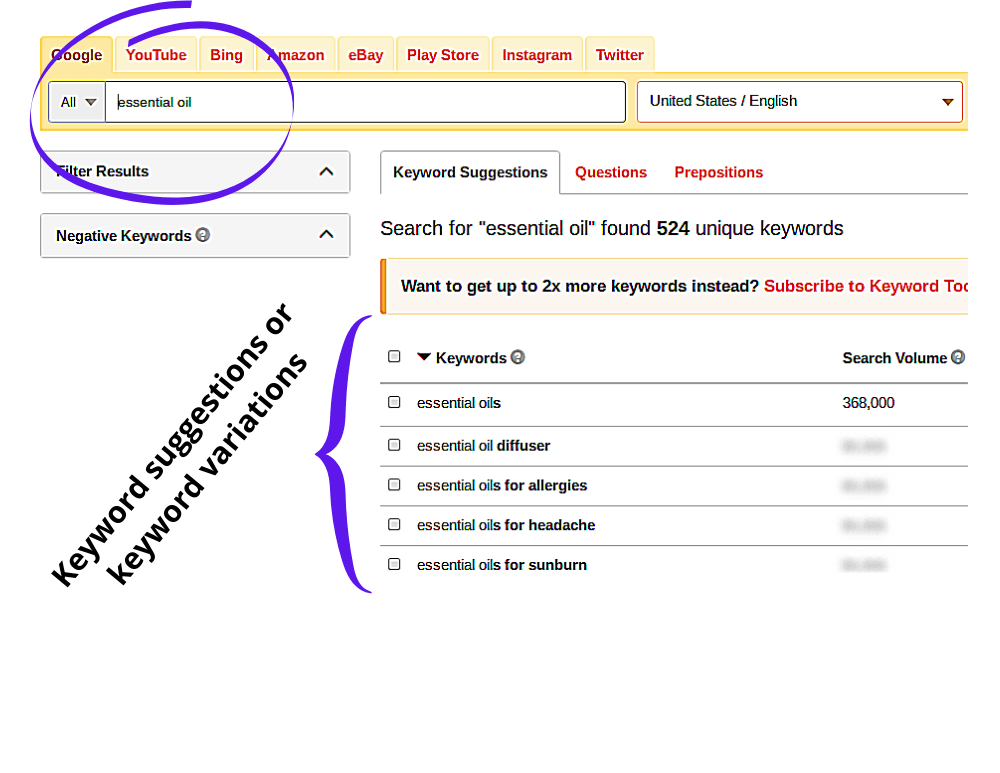
Managing Campaigns
After creating your PPC campaigns, you’ll understand precisely what is PPC in digital marketing.
In other words, it’s necessary to manage your campaigns frequently to make sure they’re worth continuing.
In fact, regularly checking your account is considered a “best practice” for success. You should always analyze your account performance and make optimal adjustments like the following:
- Adding new keywords: Expand our reach by throwing in new (relevant!) keywords.
- Use negative keywords: Non-converting terms improves relevancy, which cuts down on wasted clicks.
- Review expensive keywords: Look at keywords that aren’t performing well and refine or get rid of them.
- Review landing pages: Adjust your calls-to-action and landing page content so they’re more relevant to the specific keywords of an ad.
Diib® offers relevant and optimized keyword metrics to give you the most up-to-date and trending keyword suggestions available. You can also take a look at your competitors keyword performance and what they’re ranking for and adjust your strategy accordingly.
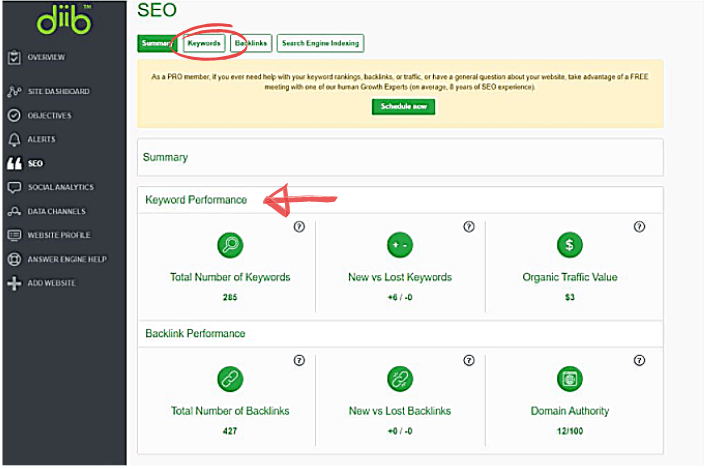
Useful Tools for PPC Campaigns
Fortunately, you’re not the first one to study the effects of keywords to maximize revenue. Using your chosen platforms, you can use a variety of well-developed tools to fine-tune your campaigns for optimal results.
Change history
Both Google and Microsoft offer change history. This is a catalog of historical updates, ranging from site link additions to changes in bid costs and everything in between.
Keyword Planner
Google offers a tool called the Keyword Planner through the Ads platform. Companies use it to discover the best keywords to use in their next campaigns. You can take it a step further and estimate your starting budget and bids for an account.
Display Planner
This tool recommends thousands of apps, websites, video channels, topics, interests, and keywords your target audience probably frequents. When coupled with the rest of your data, this information is invaluable.
Ad Preview and Diagnostics
Available in the Google Ads interface, the Preview and Diagnostics tool examines your ad and tries to figure out why it’s not performing well. Enter the language and location, and the device runs in the background.
Automated Rules
Finally, Google offers advertisers the ability to set performance criteria and a schedule for ad campaigns. These rules take the tedium out of repetitive management tasks but don’t confuse it for a total replacement.
Diib®: Building a Better PPC Strategy
We’ve discussed strategies, tips, definitions, best practices, and more. Still, this is just the tip of the PPC iceberg. Your ability to make money with pay per click marketing will only grow as you learn to refine your strategy and campaigns. Diib offers key metrics and data designed to optimize your PPC performance and build the best campaigns possible. Here are some of services that sets Diib apart from the crowd:
- Our keyword and backlink competitor research tool gives you insight into what keywords your competitors are ranking for so you create content around those keywords.
- Use Diib® to understand key metrics, like bounce rate and returning visitors.
- Social media post performance
- Broken pages where you have backlinks (404 checker)
Whether you have a vetted, established company or are new to the industry, Diib can help you with your SEO strategy. Click the link for a free 60 second site scan or to speak to a growth expert, simply call 800-303-3510.
FAQ’s
The average CTR, or click-through-rate, in AdWords is 1.91% for search and 0.35% for display. A good rule of thumb for an AdWords click-through rate is 4-5%+ on the search network or 0.5-1%+ on the display network.
As this can vary greatly, we’ve estimated costs. Businesses should expect to pay $1-$2 per click to advertise on the Google search network. On a monthly basis, the average small to medium-sized businesses can spend anywhere between $9,000 and $10,000 on PPC.
To summarize the article above. The most important factors in ppc advertising are 1) relevance: keep your ad relevant to your business needs. 2) Always include a call to action linking people directly to your product or service. 3) Track and monitor your progress and adjust accordingly.
You don’t need the Keyword Planner, however, is a free tool that can be helpful to organize and plan your strategy. You do have to have a Google Ads account in order to use the tool.
GoogleAds traffic estimator is designed to give you keyword data. However, it does give more specific data points focused around not only expected traffic, but also expected costs per click and spend data.
Enter the email you want to use to sign in to your new Google Ads account.
Enter the website address for the business you want to advertise.
Click Continue.
Sign in to your existing Google Account, or create a new one.
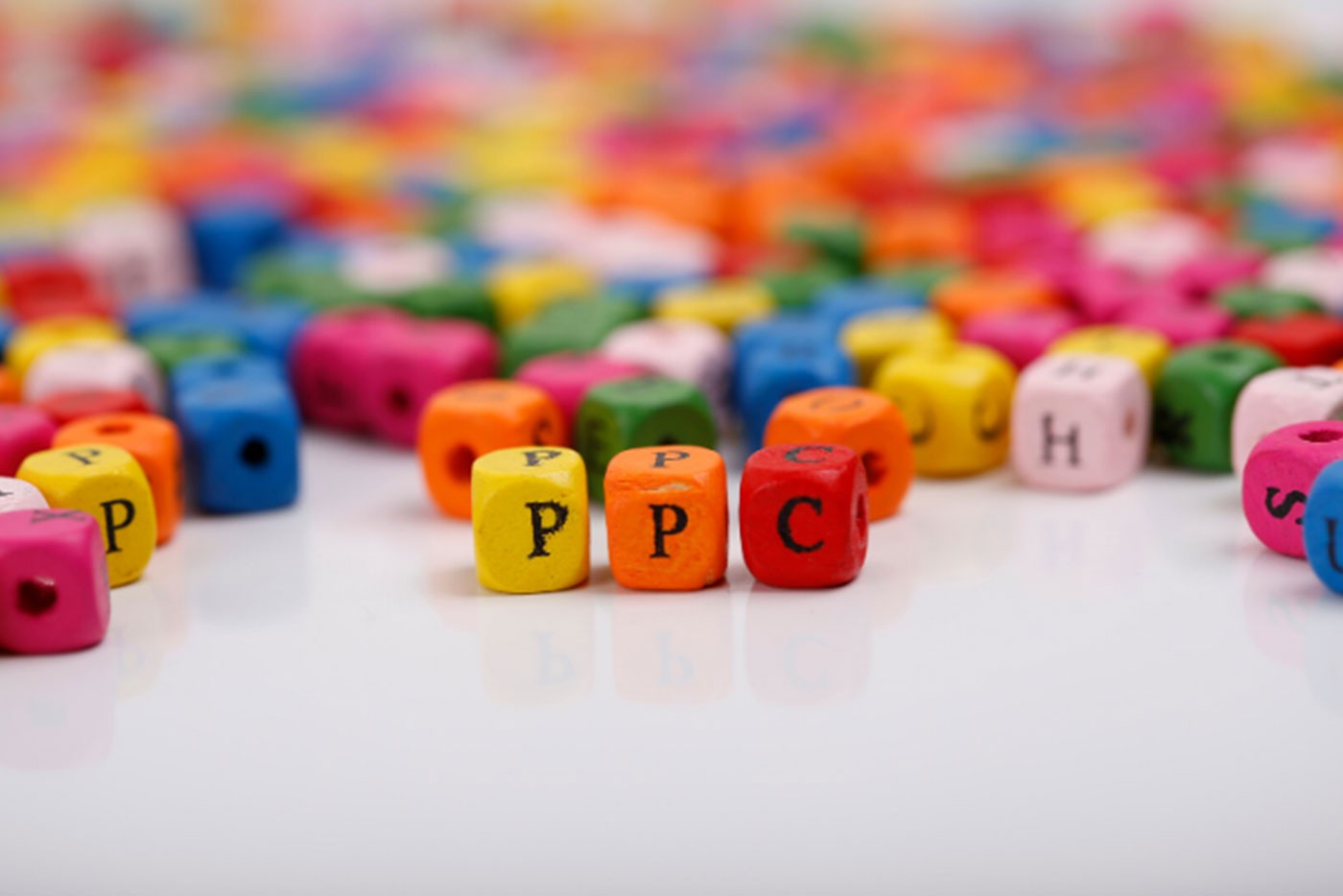



Shane McEvoy says:
Nice post Daniel and I agree Microsoft Bing can be a good alternative to Google ads for businesses on a budget. It’s also obviously useful for testing campaigns before scaling up to bigger networks. There are also a number of smaller networks too which may be worth a look depending on your target market and type of campaign.